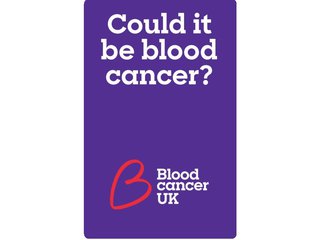Common symptoms of coronavirus are also symptoms of blood cancer
United Kingdom
Dr Alex Langridge (Haematology Registrar in the North East of England) explains the challenges of detecting blood cancer when symptoms are similar to coronavirus, and what we can do about it.

Coronavirus symptoms are well-known now – a high temperature, a cough, or changes to your sense of smell or taste. But did you know that the first two symptoms are also symptoms of blood cancer?
How common is blood cancer?
Blood cancer is the fifth most common cancer in the UK. Over 40,000 people are diagnosed with it every year. There are several different types of blood cancer, including leukaemia, lymphoma, myeloma, MDS and MPN.
Out of all types of cancer, blood cancers together cause the third highest number of deaths. However, public awareness of the symptoms is low – over half of people can’t name a single symptom.
Are blood cancer diagnoses being missed?
A pandemic like this one can cause people to put new symptoms like a fever or cough down to either suspected COVID-19 infection or another viral illness.
As well as that, people worry about going to their GP, either because of fear of picking up the COVID-19 infection, or because they’re reluctant to ‘bother’ busy doctors.
In April, the number of people coming forward with possible cancer symptoms dropped sharply, meaning lots of people who would normally have been diagnosed with cancer weren’t.
But blood cancer does still happen, even with everything else going on. And it is still the case that the earlier a cancer is diagnosed, the more likely it is that treatment will be successful.
Blood cancer symptoms that are similar to COVID-19 symptoms:
- A cough or other flu-like symptoms
- Fever (38°C or above)
- Breathlessness
- Tiredness
Other blood cancer symptoms:
- Persistent or recurrent infections
- Unusually pale complexion (pallor)
- Unexplained weight loss
- Unexplained bleeding or bruising
- Lumps or swellings
- Unexplained rash or itchy skin
- Bone, joint or abdominal pain
No – not without further investigation or tests. But there are things that can suggest something more serious like blood cancer, such as:
- having more than one of these symptoms
- having symptoms over several weeks
- having symptoms that keep coming and going.
What should I do if I have any of these symptoms?
If you develop a high temperature, a persistent cough or a change in your sense of smell or taste, you should use the 111 service (https://111.nhs.uk/covid-19/). If you cannot access the internet, call 111.
You can also request a test to confirm or rule out COVID-19 infection.
If you have any other symptoms in addition to COVID-19 symptoms, you should contact your GP and let them know. Make sure you tell your GP about all of your symptoms – often it's the combination of symptoms that can point towards a particular cause.
If you're tested for COVID-19 and are negative, but the symptoms persist after 7-14 days, then contact your GP. There may be something else that needs investigation. Your GP will ask about your symptoms and suggest what to do next.
Remember, the majority of people with these symptoms don't have blood cancer, but if blood cancer is the cause, it’s really important to find out so that you can get the right treatment.

Order your free blood cancer symptoms guide
Print or order a free pocket-sized guide to blood cancer symptoms with space to record any symptoms you think you might have.
